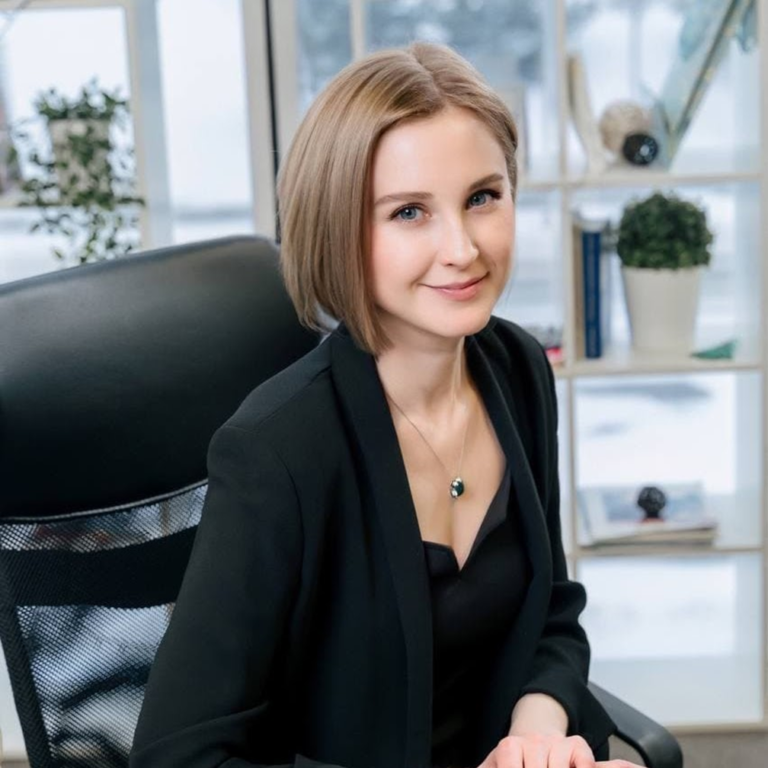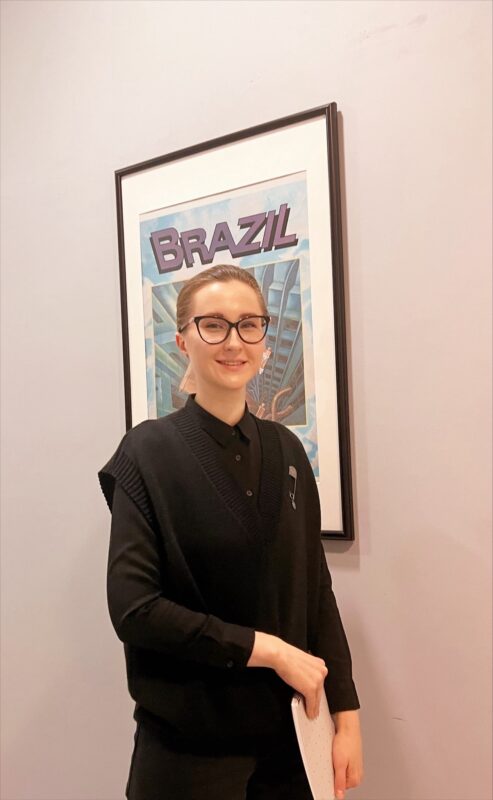Discovering Professional Stories
Anna Gross, with over 15 years of professional experience, serves as HR Director at Ailet, leading the department since 2020. A business coach and certified business consultant in management, she is a member of the international association ICI, demonstrating her commitment to excellence.

For some employees in different fields and companies HR might be one of the most confusing departments, as often employees don’t know exactly where the responsibility of HR starts and ends. So could you tell us a little bit about the main HR functions at Ailet Solutions?
HR at Ailet is a multifunctional department. To ensure that everyone understands the main functions of HR, they can be described as divided into two main areas: the first direction is employee services, and the second direction is business consulting.
For employees, Ailet HR builds a convenient service that is provided throughout the employee’s entire life cycle in our company. In that sense, HR is the face of the company welcoming employees from their entry throughout their tenure. It is a multifunctional, service-oriented department reflecting the company's essence. Also, our department strives to make service for employees simple and accessible; we try to automate as much as possible the processes associated with employees and their service. On the other hand, HR supports a culture of career development in the company using coaching approaches and devotes a lot of time to the atmosphere of the team.
For business purposes, HR offers highly qualified business consulting in the field of management. The department helps in researching and selecting the right management system depending on the stage of business development and develops and offers the necessary tools to achieve strategic goals in the field of personnel management. All of this lets the department conduct a lot of research that provides the whole business perspective by stages of transformation and growth, cultural code, and solving cross-functional issues.
What culture does the company have? What's special about it?
Ailet's culture is the most fascinating aspect that holds the entire company together. The team's collaboration, where everyone brings a piece of themselves into the team, results in the creation of a unique and impressive product. As well as it reflects our individuality and identity as a company, and it creates a strong cultural code for the company DNA. We identified this cultural code through the research and then helped develop and promote it further. We don’t impose any rules or regulations on our people, they adopt the atmosphere in which they want to work. The peculiarity of HR in this matter is to identify the DNA and promote growth and strengthening. The main feature of Ailet's cultural code is partnership. This means that there is no one here who is cooler or has more status, we all work towards one important goal and everyone is respected in their respective fields. That is why we are the architects of our ship, not the passengers.
Based on this, we are interested in studying science and technology and developing professionally. Therefore, mutual assistance in all these matters is about all Ailet employees. Everyone here is strong and cool. Each employee can propose changes, notice a problem, and talk about it, offering a solution. And this is the only way Ailet achieves results. This is very cool.

How does this culture influence Ailet?
Thanks to our culture of collaboration and partnership Ailet has achieved remarkable business results. After all, each employee shares their opinion with us or the manager to highlight problems and offer solutions and ideas. In this sense, HR and managers are aware of what employees talk about or are concerned about. Such a culture enables you to stay up-to-date and respond promptly to changes. Employees come to HR not only for career advice, but also to tell us if any process doesn’t work, or if any cross-functional or managerial issues need to be resolved. This is how Ailet is constantly renewed from the inside and, therefore, to the outside.
Based on this transparency, employees are open to telling the managers about the problems and expressing their opinions considering that a manager at Ailet is a leader and not a boss. The leader acts openly, the boss acts behind closed doors. As Theodore Roosevelt said: “People ask the difference between a leader and a boss. The leader leads, and the boss drives”.
How does such a culture help attract new employees and retain them?
The best reflection of a company and its culture on the labor market is HR. You can be very vocal about the fact that your company is a great place to work and how cool it is to be an employee here, but how do you really prove it? It is always difficult for a candidate to determine whether such a statement is true or if it is just advertising to attract specialists. That's why we take an open approach to interviews: We answer all the questions honestly and talk about the company in as much detail as possible to clear all doubts from the candidates. The first meeting with the Ailet team allows the candidate to see a real projection of the company's operations and culture. We are all a reflection of the company.
We have a tradition of holding the final interview with the candidate together with colleagues from the department for which the candidate is being interviewed. We allow the team to see their potential colleague, ask questions, and chat about abstract topics. Candidates can gain a realistic understanding of the department by observing how colleagues interact with the manager and each other, assessing the atmosphere, and evaluating the team's responsiveness. This information can facilitate decision-making for all parties involved.
As part of the onboarding process, we have implemented a mentoring system. This involves a new employee meeting the mentor during the final interview. HR monitors the onboarding process according to a developed program that is effective for our culture and work format, regardless of the employee's location.
Can you share success stories of employees embodying Ailet's values?
The success stories of Ailet employees are the success story of the company. The company grew from a small startup created by people passionate about their business. Each of Ailet's employees has a unique, multifaceted personality. The startup has united all caring leaders and experts in its field, so another feature of our cultural code is high employee involvement. We are all united in our common cause, so you will not be just another cog in the machine with us. For example, our developers not only comprehend the technological aspects of the product but also its business impact. They significantly influence both the product’s development and the company as a whole. On the other hand, our product managers not only understand market and development strategy but also successfully share their knowledge with all employees in the form of internal courses. As a result, each employee has a business understanding of the importance of the product and its development. Also, the sales team shares stories of both their successes and failures in the market which happen much less frequently. This transparency is a core value of our culture too. We integrate our values into our work lives rather than simply memorizing them.
Considering that Ailet’s employees live in different places around the world. How do you manage to onboard newcomers globally, what are the challenges and how do you overcome them? Also, what can you tell about the onboarding process in the company?
Yes, the geography of the Ailet team is very extensive. Our employees work not only from different countries but from different continents. This means that we have to deal with different time zones too.
Initially, back in 2019, the company began to build processes and switch to a remote work format. From that moment on, all company managers began to develop processes for communication, task management, and rapid resolution of complex issues, taking into account the remote format. All managers made efforts to ensure that the processes were effective, and our team began building processes for working with personnel, aligned with the specifics of the work format. We have developed an efficient onboarding system that allows us to bring new employees on board regardless of their location or time zone. In addition, all company processes are designed to accommodate the remote format and multiculturalism. We have managed to achieve a result that does not reduce work efficiency, and employees are aware of what is happening in the company even within one working day. There are no problems with onboarding, but employees often comment that they would like to meet in person, which is not always possible since we have a vast geography. It appears that there is still room for improvement in this regard. It turns out that remote work can be both effective and engaging, and joint offline meetings and activities are still to be held. It is important to note that this format should appeal to employees, as working remotely is a positive experience.
We are currently developing an effective workspace with remote work in mind, aligning our culture and brand accordingly. We have big plans for this year and I look forward to sharing the results in a future interview.
